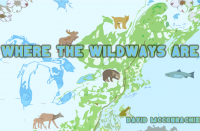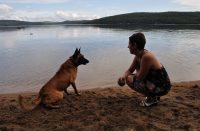LISTEN TO the full 45-minute interview with Buzz Holling on our Podcast page.
Nicola Ross: You’ve written that “Novelty emerges from the interaction between opportunity and crisis.” Can you explain what you mean by novelty?
LISTEN TO the full 45-minute interview with Buzz Holling on our Podcast page.
Nicola Ross: You’ve written that “Novelty emerges from the interaction between opportunity and crisis.” Can you explain what you mean by novelty?
Buzz Holling: Novelty is something that is new, and something that emerges from invention. The reason that sentence links crisis and opportunity is because novelty typically emerges only from the sea of invention that exists when there is some sort of crisis that makes people seek new ways of doing things. Crisis to me is both creative and destructive. It destroys accumulated rigidities, but it is creative in the sense that it utilizes the creative capital for new opportunity.
Ross: You say that we want rare transformations, not simple change. Is this something we can design for, or is this something that just happens?
Holling: We see three kinds of change. One is very incremental and slow, very common and terribly important. The second is more disruptive. For example, in a business when there has been a saturation of markets, or in an ecosystem when a forest changes through some event like a forest fire. The third kind is transformation that is still deeper than the other two, and involves a change in the structure of relationships across scales. In a social system, you have a range of examples of societies that have collapsed. Take the Mayans, for example. They moved to a state of increasing rigidity and organization, such that when change was needed the structure made it impossible to do so. The politics and religious relationships prevented any exercise of actions that could transform that society in a constructive way. Contrast that to a transformation that moved the hunter-gatherer societies into agricultural and industrial [societies]. I think we are in the midst of another one. It may not be as great and deep a transformation as from hunting-and-gathering to agriculture, but it is a major economic, social and environmental transformation.
We are headed in a direction of considerable unknown. That’s the feature of this theory itself and its discoveries. There are things you know, there are things that you are uncertain about, and there are other things that are simply unknown. When you move into a rare transformation, you are moving into a world of deep unknowns. You know some things you need to do, like control rigidities and stop them from inhibiting change; you know you have to protect the sources of knowledge you’ll draw on. You will have to introduce experiments to test out ideas and inventions that are not incorporated in society yet, but could be, and are needed to synergize for the next step of the transformation.
Remember, there is a human creature called the “explorer” – an individual who journeys into the unknown. An innovative scientist journeys into landscapes of the mind that are unknown. Nevertheless, there is a great resistance to transformative change, and there will be strong efforts in the existing power bases to prevent any transformative change.
Ross: Is climate change an unknown unknown?
Holling: I agree with that. We are in the midst of climate change right now. We are in a major transformation that is reflecting the way the world is linked across space through atmospheric processes, and the consequences that link oceans, land and atmosphere. It’s truly moving our world into regimes of behaviour that we’ve never seen before, so that the natural systems, social systems, economic systems and ecological systems, have not adapted to what is emerging. Not having adapted, the consequences of climate change mean that the responses of the people, vegetation, and so forth, will be inherently unpredictable. The key is resilience.
Ross: How effectively have we dealt with climate change so far?
Holling: It has been quite ineffective, but it will become more effective as time progresses. The first step is to recognize that the climate is going to change. It’s irreversible. It might change in one direction in one region, and another direction in another. The second set of things to do is adaptive experiments. That is, assume there will be effects from climate change, and then invent experiments that can benefit from that. An example is salmon on the West Coast of North America. The southern populations of some species have been sharply reduced. The population distribution will move northward, possibly establishing the Mackenzie River as one of the spawning beds. We should maintain attributes along those rivers in an experimental way to determine if they would provide a source of spawning for salmon.
Ross: But can the international political process effectively deal with unknown unknowns?
Holling: The more dramatic the change needed, the more difficult it is. It’s unavoidable, the international political system has to adapt, but we have to recognize that the political changes required will be too slow internationally. In addition, one has to identify and implement regional experiments that address global issues.
Ross: The role of research organizations may change over time. Can they become stale?
Holling: For many of the ideas I’ve published on using ecological or economic information and data, the initial idea came from the experience I had in research organizations. They go through the process of an initial pioneering stage of innovation and invention and novelty, through a slow process of accumulating reputation and papers and results, to the point where more and more groups depend upon that organization continuing as it was, so they become embedded in a particular way of doing things. The novel ideas that continually appear often move to some other organization that is in an early phase of development. The organization that generated those ideas, or the environment for those ideas continues, but in a less productive way. I see those organizations going through that same cycle. In my career, I’ve been in about six different organizations. In all cases, I entered them early when they were in their pioneering phase, and I left them as they were starting to become more rigid.
Ross: Dr. Frances Westley at the University of Waterloo has described three types of scientists: consolidators, technical talents and artists. What does she mean?
Holling: The main body of science was established to be skeptical of anecdote. It was the solution to the anecdotes that are continually appearing to explain some phenomenon of nature. They are just anecdotes; they have no connection with reality. The basic scientific method as described by laboratory experimental approaches is a way to get rigorous understanding that is testable and legitimate. So a major body of science, in terms of both training and its application, is designed to be deeply skeptical, and control the damage from anecdote. But the real future of science lies in the appearance of totally novel theories and inventions. Those don’t come from skepticism; they come from the visionary activity of an individual with some scientific background, but who is less constrained by the need to be skeptical, and yet can combine that vigour of vision and embrace the unknown. These are the artists.
Ross: That would be you?
Holling: I would be honoured to be so considered. In my career, I have great respect for scientific skeptics, but they have frustrated me deeply at times. Usually in the work that I’ve done, the part that I see as innovative has typically taken 25 to 30 years before getting through the cloud of skepticism to be embraced as an integral part of existing knowledge.
Ross: Do we have the time?
Holling: So long as climate change occurs at the pace that we expect, which isn’t necessarily true, then we do have the time. If, as is entirely possible, unexpected processes suddenly flip the system so that the changes occur much more rapidly, we will be in difficulty. And we will need the most ebullient and powerful ways of inventing and resisting the forces that prevent or slow invention.
Ross: And our current economic crisis?
Holling: It’s a typical example of a long process that I trace back to the collapse of the Berlin Wall: a long period of economic expansion and activity and efficiency driven by incremental changes and that first phase of disruptive changes. And a long process of accumulating resources and expanding over space until it becomes a global economic system. As time progressed, more and more rigidities started to appear, with more efforts to hide those rigidities and capitalize on them. So the big property bubble – that was so utterly insane – was happily looked upon as a huge opportunity of making a hell of a lot of money. And that started the destabilization, which then progressed as elements have collapsed into a broader set of consequences. So it’s a classic example of a transformative, rather than incremental, crisis that emerged because of rigidities that had inhibited a more moderate kind of transformation. We’re now in the “big one,” which has become, because of the global character of the economics, a global phenomenon.
Ross: Do you believe that environmental good can come from this economic crisis?
Holling: Just possibly. [Oh my goodness, there’s a deer outside my office! A lovely black-tailed deer!] I think it’s possible, in the sense that if the collapse occurs in a dramatic and extensive way so that the economic system can become partially disengaged, then the intensity of economic impact on the environment will weaken. But one hopes for something deeper, an integrative understanding and approach to the way that humans relate to the world, and the way the world relates back to humans.
The Stockholm Resilience Center has videos of lectures from top resilience researchers at http://www.stockholmresilience.org. One video features Holling describing the origins of his resilience thinking.
Nicola Ross is the former Editor of Alternatives Journal, and is a member of the editorial board.












